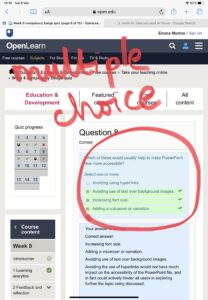Questions and tensions at the intersection of open systems and badges
An analysis of the open badge course: Take Your Teaching Online (OpenLearn – Free Learning from the Open University) with direct reference to Ahn et al. 2014 (Open badges for education: what are the implications at the intersection of open systems and badging?)
Open Production
Ahn et al. ask the question ‘Does the source of a given badge affect users’ motivation to earn that badge?’ My experience was an emphatic yes. I liked that I was choosing a course that had the academic reputation of the Open University behind it. This gave the course a feeling of pedagogic quality that I didn’t feel when I had a look at P2PU Badges. In my mind I wanted something academic rather than ‘frivolous’ such as learning a soft skill! I think that is the trait of a digital immigrant rather than a digital native! In line with Ahn’s consideration of how important the credibility of the badge might be for an employer, OpenLearn ticked the box for me.
Open Access
In previous blogs, I have criticised open education for lacking an important level of interaction. The MOOC I did gave a semblance of interaction through a forum, which felt very one-sided and anecdotal. Ahn et al. also raise the question of how learners can access support and feedback; how can they access the meaningful relationship that is so vital to education? My open badge course was devoid of interaction.

Screenshot of one of the final assessment questions on the OpenLearn course.
The assessments were run by bots, with a lot of multiple guess questions and there was no sense of community. On the otherhand, The P2PU (Peer 2 Peer) Badges website was far more personal and was clearly working at creating a feeling of community. Their opening line is:
![]()
Perhaps I should have chosen one of those courses instead?

OpenLearn home page.
On the two websites there is a marked difference in how an open badge course is implicitly introduced. Rather than being presented by a row of pencils on the OpenLearn website, supposedly to imply diligence and academic rigour…..
I am invited to meet the ‘learners’ on the P2PU website.

P2PU home page
The access to learning with P2PU is far more akin to the social learning and the learning ‘to be’ that is explored in Brown, J. S., & Adler, R. P. (2008). Minds on fire: open education, the long tail, and Learning 2.0. The ‘Learners’ learn from the ‘Experts’ who give feedback and guidance. An ‘Expert’ is someone who has already done the course and earned a badge. All about P2PU badges explains the process. P2PU are putting into practise what all the research advocates: create meaningful relationships, ensure the learning journey to gain a badge is meaningful (Halavais) and provide a level of transparency that I felt was missing from the OpenLearn setup.
N.B. I was interested that the P2PU website did not appear to have been updated since 2013. Has peer to peer learning had its day? Whilst the drier, yet perhaps more weighty OpenLearn website is clearly still active.
Open appropriation

Screenshot of my final assessment pass. Success without having done any of the work. I worked out I could go back and copy answers from sections, without doing the work…
What motivations did the badge course engender in me? I felt that the OpenLearn badge course carried a certain credibility that might impress an employer. The course itself was meaty and one had to concentrate. Having said that, I was able to jump to the final assessment, bypassing 8 levels and complete and pass it! I am pleased to say the algorithm of the course was clever enough not to issue me with my badge, as I had only officially completed 9%. I became far more motivated in trying to outwit the system and jump a level, rather than enjoy the learning. This reward of behaviour, ‘pop behaviorism’, (Kohn 1993; Halavais 2015) became my overriding motivation.
I do think the question of how learners can be supported to make decisions about which badges might be appropriate is a relevant one. I have plenty of colleagues (as I mentioned in my previous blog) who are reasonably naive in choosing courses to follow. But does that really matter? It matters if there is a motivation to use the badges as a stepping stone to greater things; uou need to make sure you’ve chosen appropriate courses. If one’s motivation is to simply learn, then it is a joyous opportunity to be able to choose whatever you wish to study.
The Mozilla Open Badges Infrastructure provides a level of accreditation that helps make the badges acceptable to outside stakeholders. Without it, the earning of an online badge would become trivial and exploitable. In a developing country like Kenya, an open badge course is manna from heaven. It gives one a window of opportunity. Kenyans love nothing more than exploring soft skills. The bookshops have hardly any fiction books, yet there are groaning shelves with the latest self-help and motivational bestsellers. Open badge courses are often seen by them as being akin to self-help. This echoes Ahn’s comment that different communities might re-appropriate the meaning of badges.




Another good post illustrating or expanding on points made in your previous post. P2PU does seem to be active largely in the area of learning circles meeting either online or in-person. The idea of linking badges – or any microcredential – in to coherent programmes of study is a clear next step. At the moment, this seems largely to be as a micro-credential as part of one larger programme (a more traditional academic qualification in that particular subject) rather than opening up a number of alternative pathways. This is sometimes described in microcredits as stackability.
Just for information, Mozilla have withdrawn from the badge infrastructure and handed them over the IMS – Mozilla founded and IMS are continuing with a badges open technical standard rather than accrediting the content or quality of the achievements claimed in any particular badge. – does the technical standard (on the ‘baked in’ metadata in a badge png image sufficient to give it credibility?).